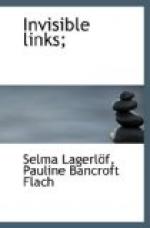And gently, gently he bends his arm, which has almost lost the power of moving, and his little fiery eyes stare down into the nest.
Never had he seen anything so helplessly ugly and miserable: small, naked bodies, with a little thin down, no eyes, no power of flight, nothing really but six big, gaping mouths.
It seemed very strange to him, but he liked them just as they were. Their father and mother he had never spared in the general destruction, but when hereafter he called to God to ask of Him the salvation of the world through its annihilation, he made a silent exception of those six helpless ones.
When the peasant women now brought him food, he no longer thanked them by wishing their destruction. Since he was necessary to the little creatures up there, he was glad that they did not let him starve to death.
Soon six round heads were to be seen the whole day long stretching over the edge of the nest. Old Hatto’s arm sank more and more often to the level of his eyes. He saw the feathers push out through the red skin, the eyes open, the bodies round out. Happy inheritors of the beauty nature has given to flying creatures, they developed quickly in their loveliness.
And during all this time prayers for the great destruction rose more and more hesitatingly to old Hatto’s lips. He thought that he had God’s promise, that it should come when the little birds were fledged. Now he seemed to be searching for a loop-hole for God the Father. For these six little creatures, whom he had sheltered and cherished, he could not sacrifice.
It was another matter before, when he had not had anything that was his own. The love for the small and weak, which it has been every little child’s mission to teach big, dangerous people, came over him and made him doubtful.
He sometimes wanted to hurl the whole nest into the river, for he thought that they who die without sorrow or sin are the happy ones. Should he not save them from beasts of prey and cold, from hunger, and from life’s manifold visitations? But just as he thought this, a sparrow-hawk came swooping down on the nest. Then Hatto seized the marauder with his left hand, swung him about his head and hurled him with the strength of wrath out into the stream.
The day came at last when the little birds were ready to fly. One of the wagtails was working inside the nest to push the young ones out to the edge, while the other flew about, showing them how easy it was, if they only dared to try. And when the young ones were obstinate and afraid, both the parents flew about, showing them all their most beautiful feats of flight. Beating with their wings, they flew in swooping curves, or rose right up like larks or hung motionless in the air with vibrating wings.
But as the young ones still persist in their obstinacy, Hatto the hermit cannot keep from mixing himself up in the matter. He gives them a cautious shove with his finger and then it is done. Out they go, fluttering and uncertain, beating the air like bats, sink, but rise again, grasp what the art is and make use of it to reach the nest again as quickly as possible. Proud and rejoicing, the parents come to them again and old Hatto smiles.




